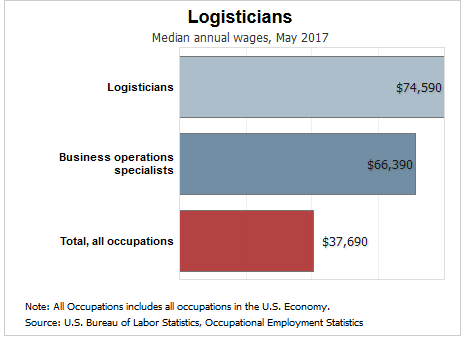
Reasons to Earn a Degree in Logistics
Logistics is a booming industry, full of opportunity and growth, making it a popular degree option among aspiring business professionals. But what else makes a logistics degree so valuable these days? We’ve put together a list of five reasons why earning a degree in this field is a wise career move with the potential for awesome professional and personal payoff.
- Reason #1: Your Salary Potential Is Strong
- Reason #2: Your Career Opportunities Are Limitless
- Reason #3: Jobs Are Available At Almost Every Educational Level
- Reason #4: Logistics Offers Variety And Opportunity For Growth
- Reason #5: You’ll Be Prepared To Lead Innovation
Reason #1: Your Salary Potential Is Strong
Let’s face it, money is a motivator, and logistics careers typically pay well. The Bureau of Labor Statistics (BLS) reported a median annual wage of $74,590 in May 2017. Not bad, right? Imagine what you can earn after you’ve worked in the field for a few years; perhaps a six-figure salary is in your near future. If you get an advanced degree in this field, the opportunity to earn more increases. You might want to consider pursuing a master’s degree to boost your earning potential.
Employment of logisticians is projected to grow 7 percent from 2016 to 2026. This is about as fast as the average for all occupations, according to the BLS. Employment growth will be driven by the need for logistics in the transportation of goods in a global economy. Companies will need more logisticians to move products more efficiently, and to identify areas for improvement.
The graph below illustrates the median annual wages of logisticians in May 2017, in comparison to all occupations in the US Economy (source: BLS.gov: Occupational Employment And Wages: Logisticians, data for May 2017).

Reason #2: Your Career Opportunities Are Limitless
No matter what, companies will always needs employees to help with distribution of merchandise. Without logisticians, manufacturing and other businesses would have a very hard time succeeding. Logistics keeps the supply chain flowing, which in return, keeps you employed. Logistics is definitely a field with limitless potential.
There are also several occupations with job duties similar to those of logisticians, such as the ones listed below:
- Industrial Production Managers: Industrial production managers oversee the daily operations of manufacturing and related plants.
- Quality Control Inspectors: Quality control inspectors examine products and materials for defects or deviations from specifications.
- Management Analysts: Management analysts propose ways to improve an organization’s efficiency and how to reduce costs and increase revenues.
- Industrial Engineers: Industrial engineers devise efficient systems that integrate workers, machines, materials, information, and energy to make a product
Logistics are seen as key in the supply chain. That means most companies, in almost every industry, need employees trained in logistics. The industries with the highest levels of employment in this field include the following, according to the BLS:
- Truck Transportation
- Management of Companies and Enterprises
- Warehousing and Storage
- Federal Executive Branch
- Local Government, excluding schools and hospitals
If you’re not sure what industry you want to work in, it may help to shadow senior leaders and learn from them. For example, if you’re interested in working in truck transportation, find a local company and inquire about touring the office and the distribution center. You might find this experience incredibly useful when applying for jobs.
Reason #3: Jobs Are Available At Almost Every Educational Level
A bachelor’s degree is often required for most logistician positions. Related work experience may substitute for education along with industry certification. This field has entry-level positions as well as career opportunities for job seekers with more experience. Entry-level opportunities include forklift operator, material handler, and truck drivers, while mid- to upper-level positions include operations managers, logistics analysts, and purchasing agents.
However, by earning an advanced degree, you might qualify for leadership positions. But a bachelor’s degree will get your foot in the door and off to a great start in the industry. Below are a few of the typical entry-level positions:
- Planner or Analyst: Responsible for assembling data, identifying problems, and developing recommendations which support the management of a supply chain.
- Buyer: Identifies sources of supply, evaluating and selecting suppliers, negotiating contracts, and managing relationships with suppliers.
- Inventory Specialist: Responsible for inventory quality and accuracy, monitors inventory flow, and works on stock location and order picking strategies to optimize work flow and labor productivity in distribution facilities.
- Materials Planner: Coordinates with purchasing, manufacturing, and suppliers to ensure reliable, cost efficient delivery of materials.
- Transportation Coordinator, Traffic Analyst: Manages relationships with carriers and customers to ensure the timely delivery of goods.
If you’re interested in researching your degree options, the following programs might make excellent options:
Reason #4: Logistics Offers Variety And Opportunity For Growth
Logistics is a diverse field, with a wide variety of sub-sectors, keeping your daily schedule both interesting and challenging. You’ll learn about many different industries, and how they function. You can work in a for-profit setting, or with non-profit organizations. It’s all up to you, and what you’re most interested in doing. A great way to determine what industry best suits you is to secure an internship while in school. You can intern at a large corporation, a non-profit, a government agency, and many other places that need individuals with a passion for logistics.
There are many benefits of internships, such as:
- Explore a career path
- Give yourself an edge in the job market
- Develop and refine skills
- Network with professionals in the field
- Transition into a job
Logistical work is fast-paced and constantly evolving. If you like working in an environment that is challenging and stimulating, logistics offers both. Logisticians often work against the clock to meet tight deadlines. They also need strong communication skills to do business with suppliers and customers. These skills can be used effectively in many different roles, which helps with career advancement and job mobility.
Logistics managers often collaborate with other departments to integrate logistics with business systems or processes. They also create policies or procedures for logistics activities, and resolve problems concerning transportation, logistics systems, and imports or exports. As a logistician, many people depend on you! It’s their planning that allows everyone else to do their job well.
If you decide to earn a master’s degree, your opportunities for advancement will likely increase. You can also look into earning certifications. These are available from the Defense Acquisition University (DAU). These certifications are required for Department of Defense acquisitions. The more experience you have, the more opportunities you are qualified for. Some schools offer a PhD in logistics or related field. Those who complete a doctorate often move on to work as administrators, analysts, and resource specialists.
Reason #5: Gain International Business Experience
Gaining international business experience is pretty cool, and perhaps the most exciting reason to earn a degree in logistics. You’ll develop relationships with professionals around the globe, if your employer deals with international customers – and most do! Who knows, you might score a few travel opportunities to Asia, South America, or anywhere for that matter. If you decide to work as a consultant, you can choose which companies you want to work for, leading to even more opportunities to travel and work with a variety of clients.
There are plenty of useful resources out there to help you learn as much as possible about the logistics industry. Check out the list of sites below to access some interesting data and career information about this ever-growing industry:
- The Bureau of Labor Statistics: Occupational Employment and Wages: Logisticians, May 2017
- U.S. News and World Report: What is a Logistician?
- Select USA: Select USA: Logistics And Transportation Spotlight
Logisticians work in almost every industry, making this a rapidly growing field. Your opportunities are endless, and the market is competitive. Many schools, both online and traditional, offer degrees in logistics and related fields. Remember, a degree in supply chain management is not always the same as a degree in logistics. It’s important to research each program to make sure it’s the right fit for you.
